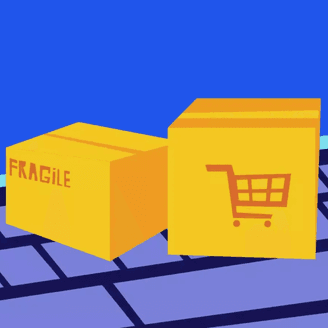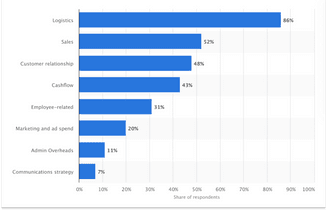- Osome Blog HK
- Must Know Hong Kong Ecommerce Trends in 2025
Must Know Hong Kong Ecommerce Trends in 2025
- Modified: 16 January 2025
- 8 min read
- Ecommerce


Heather Cameron
Author
Heather is here to inform and inspire our readers. Boasting eight years in the world of digital marketing, working in diverse industries like finance and travel, she has experience writing for various audiences. As Osome’s resident copywriter, Heather crafts compelling content, including expert guides, helpful accounting tips, and insights into the latest fintech trends that will help entrepreneurs, founders and small business owners in Hong Kong take their businesses to the next level.
Ecommerce was already on the rise before the COVID-19 pandemic hit. Driven by the coronavirus, ecommerce retailers across Asia have witnessed a surge in sales, as lockdowns became the norm. Hong Kong is no exception, with its strategic location as an international business hub. In fact, it is rapidly growing as one of ecommerce's most dynamic markets as the city-state sees more residents adopting a digital lifestyle.
If you're looking to tap into this thriving market, Osome offers comprehensive company registration services to establish your online business in Hong Kong efficiently and compliantly.
What Are Ecommerce Trends?
Ecommerce trends are at the core of online shopping for your savvy consumers, and act as your roadmap to the future of ecommerce.
For instance, social media has evolved rapidly enough to influence ecommerce. With features such as Instagram Checkout and Facebook’s Buy button, social media presents more opportunities than ever for brands to be discovered and to sell their goods and services online.
Virtual reality (VR) has also transformed ecommerce businesses, with brands showcasing their products in VR to allow consumers to better visualise the products and understand if it is what they need.
Ecommerce in Hong Kong
With over 4.5 million online shoppers, the growth of ecommerce in Hong Kong will continue beyond the pandemic. According to the South China MorningPost, ecommerce sales in Hong Kong grew 27% in 2020. Today, 50% of Hong Kong’s consumers prefer online shopping.
In fact, the growing market shows no signs of slowing down, with the projected number of users expected to reach 6.6 million by 2027, with a user penetration rate of 84.1%.
Understanding the Hong Kong ecommerce landscape through data and metrics can help you make more well-informed decisions for your ecommerce shop:
Expected Revenue in 2025 | Number of Users |
|---|---|
| USD $29 billion | 4.2 million |
In Hong Kong, revenue in the ecommerce market is projected to reach about US$4.7 billion in 2025 according to Statista. Revenue is expected to show an annual growth rate (CAGR 2025-2029) of 8.72%, resulting in a projected market volume of US$7.248 billion by 2029. Hong Kong ecommerce market's largest segments in 2025 are Food and Fashion
Key Metrics
According to GlobalData, the B2C ecommerce market size revenue was valued at $6.4 trillion in 2023 and is expected to grow at a CAGR of more than 9% over the forecast period.
Users by Age | Percentage (%) |
|---|---|
| 18 - 24 years old | 11.6 |
| 25 - 34 years old | 25.8 |
| 35 - 44 years old | 27.6 |
| 45 - 54 years old | 26.2 |
| 55 - 64 years old | 8.8 |
Hong Kong’s user penetration would cover 52.9% of the population in 2025 and is forecasted to reach 73.1% by 2029. The average revenue per user (ARPU) is expected to reach USD $1.242k, as projected by Statista.
Key Statistics
Most Popular Goods Purchased
According to Statista, fashion, furniture, and consumer electronics are the top three ecommerce categories in Hong Kong by 2025.
However, JP Morgan’s 2019 study revealed that travel, health and beauty, and consumer electronics were the most popular categories pre-pandemic. With more and more countries opening up to the rest of the world, an increase in travel-related products can be expected.
Cross-border Purchases
Hong Kong online consumers are also purchasing from overseas, with China topping the list. Additionally, Singapore and Japan are also popular options.
The Covid-19 Impact on Hong Kong’s Ecommerce

Most Affected Areas of Ecommerce Business by Coronavirus Outbreak in Hong Kong 2020
According to a study by Paypal, approximately 86% of mid to large ecommerce enterprises faced challenges with logistics and fulfilling orders. 43% of the merchants’ cash flow also suffered due to COVID-19.
From the consumer side, more than half of Hong Kong’s online shoppers purchased more groceries and personal hygiene products online between January and June 2020. Less money was spent on non-essential products during this time as many Hong Kong consumers were threatened by job losses or lower earnings.
The new top purchase criteria in Hong Kong are found to be value for money, ease of shopping experience and product quality. Consumers’ overall positive online shopping experiences ensure that they would continually visit and make more purchases from ecommerce stores compared to before the start of the coronavirus outbreak, KPMG’s study highlighted
Most Popular Online Stores in Hong Kong
The most popular online shopping platforms and marketplaces in Hong Kong include Taobao, Amazon, JD, HKTVmall, FORTRESS, YOHO, Strawberrynet, ZALORA, MyDress, Suning, Ztore, and Broadway Lifestyle.
With so many online shopping platforms to choose from, the ecommerce landscape has proven to be too crowded for ecommerce giant Alibaba, with its popular Tmall site being shut down in Hong Kong on 31st October 2022. This reinforces the importance of keeping up with ecommerce trends and maintaining a competitive online store to remain relevant and appeal to local consumers.
The 5 Top Hong Kong Ecommerce Trends
Hong Kong is undoubtedly a prime market for the growth of ecommerce, with its excellent smartphone, internet and banking penetration laying the groundwork. Nonetheless, merchants will have to set themselves apart from the competition by leveraging ecommerce trends and maintaining a competitive online store to continue attracting consumers. As consumers’ needs evolve in a post-pandemic era, ecommerce trends continue to keep pace.
Here are the latest ecommerce trends in 2025 we have identified:
1 Retailers Go Online
Since the pandemic, Hong Kong’s physical store retailers have seen a decline in Year on Year sales, down 44% in February 2020, according to its Census and Statistics Department’s data. The stores needed an online presence to survive.
According to a Nielsen survey, the survey for its food and beverage sector revealed that 46% of Hong Kong consumers preferred eating in their homes than dining out. The Hong Kongers are increasingly opting for food delivery, takeaways and cooking at home during the peak of Covid-19 outbreak in 2020, and this trend would likely continue beyond the pandemic.
Businesses in Hong Kong are widely adopting the online-to-offline model (O2O) to meet online demands. According to Shopline, more than 50% of Shopline’s ecommerce Hong Kong retailers own physical stores. In the long term, 20% of its merchants are considering fully adopting the O2O model, supplemented by setting up pop-up stores.
Traditional brick-and-mortar retailers are enticed to adopt the O2O model as they could sell 24/7 online, and not be limited by store closures during the night. 78.3% (almost 4 out of 5) of the merchants believed that being operational round the clock would give them a competitive advantage.
2 Credit Cards and Digital Wallets as Preferred Payment Methods
Credit cards account for USD $1.8 billion in annual sales – slightly below half of all ecommerce payments. This shows that credit cards are the preferred way to shop online, dominated by Visa, American Express, and Mastercard.
Additionally, bank transfers and digital wallets see increased adoption rate in Hong Kong, at 12% compounded annual growth rate (CAGR). An estimated 48% of all online transactions would be done by bank transfers and digital wallets by 2023.
At the same time, Hong Kong shoppers are growing out of prepay methods (27% drop in CAGR), debit cards (14% drop in CAGR), and cash on delivery (13% drop in CAGR). These shifts are having a significant impact on ecommerce businesses in Hong Kong.
2.1 Online Payment Methods
A quarter of all ecommerce payments in Hong Kong (HKD $0.9 billion per year) are completed by digital wallets, making it the second most preferred payment option in Hong Kong.
Total transaction value in the digital payments segment is projected to reach US$40.85 billion in 2025. It is expected to show a CAGR 2025-2028 of 8.46% resulting in a projected total amount of US$56.53 billion by 2028. In 2025, Hong Kong is advancing its smart transportation network by incorporating Weixin Pay and WeChat Pay HK, Tencent's digital payment platforms, into more city transportation services. These platforms are now used with New Lantao Bus, Tramways, Citybus, and Star Ferry, in addition to MTR, Kowloon Motor Bus, and Long Win Bus, as reported by the company.
To thrive in Hong Kong’s fast-evolving payment landscape, focus on convenience and innovation. Adopting digital wallet options and optimising for seamless online transactions can give your business a competitive edge as consumer preferences shift away from traditional payment methods.
3 International and Cross-Border Merchant
When shopping online, Hong Kong citizens are willing to spend. With online sales platforms including Taobao, Amazon and JD, domestic merchants can enter the market and collaborate with international ecommerce providers.
Cross-border spending is also high – JP Morgan's 2019 study revealed that 75% of Hong Kong's online consumers have purchased from overseas, with the most popular markets being China, Singapore, and Japan. In fact, cross-border spending makes up the bulk of Hong Kong's online purchases, accounting for 60% of the total ecommerce spend (US $2.2 billion).
For your international or cross-border partnerships, ecommerce fulfillment shipping is important to help you scale your online business.
4 Uprising Mobile Commerce

Mobile commerce lets consumers shop from online shopping platforms without the use of desktops and laptops. Virtual marketplace apps such as Amazon, in-app purchases, using digital wallets, and mobile banking are all examples of mobile commerce platforms.
According to Worldpay Merchant Solutions, more consumers prefer to shop on their mobile phones and that this trend will continue to grow. Merchants who study their consumers’ behaviours and provide an engaging online experience for them would profit in their ecommerce businesses. Ecommerce Hong Kong merchants should offer the digital wallets that their consumers frequently use, as digital wallets transactions would make up a third of all purchases in Hong Kong’s ecommerce purchases over the next five years.
Additionally, Hong Kong launched 5G, providing its consumers with increased internet speeds. As a result, consumers are able to effortlessly purchase goods and services from their mobile phones, which further contributes to the rise of mobile commerce.
With mobile commerce on the rise, optimising your online store for mobile users is a must. Focus on seamless experiences, fast-loading pages, and integrating popular digital wallets to capture the growing demand for on-the-go shopping in Hong Kong.
5 Improved Customer Payment Experiences
With the rapidly evolving landscape of ecommerce, the competition in the global and domestic ecommerce market remains intense. As such, merchants continuously work on new business models to cater an improved experience for the consumers.
For instance, new ecommerce business models such as 'buy now, pay later' have emerged, to allow consumers to pay for their online shopping through interest-free instalments. This benefits those who want to buy something online, but are not able to fork out the entire amount.
One of these global ecommerce trends is Singapore-based Hoolah, which was made available in Hong Kong in November 2020.
In Short, What You Need To Know
- Online shopping has remained popular with Hong Kong consumers beyond the pandemic, with more retailers moving online.
- Credit cards are the preferred way to pay when online shopping in Hong Kong, with digital wallets and bank transfers seeing increased adoption. Prepay methods, debit cards, and cash on delivery payment options are falling out of favour with Hong Kong shoppers, highlighting a shift in consumer preferences towards more convenient ecommerce business transactions.
- International and cross-border merchants can leverage Hong Kong's existing high-quality infrastructure, with 75% of Hong Kong's shoppers having purchased from overseas. The most popular markets are China, Singapore, and Japan.
- Mobile commerce has changed the way Hong Kongers shop, and this trend is likely to continue with Hong Kong's introduction of 5G. Digital wallets are projected to be one of the preferred payment options over the next five years.
- Merchants have to constantly come up with new ecommerce business models to attract consumers, and the "Buy Now, Pay Later' method is one way to do so. This allows shoppers to pay through interest-free instalments, instead of having to pay for purchases in one lump sum.
Focus on growth, not financial admin. Want to grow faster and free up your time spent on business and financial admin? We’re here to help. Our accountants are experts in ecommerce businesses and are here to support you.






